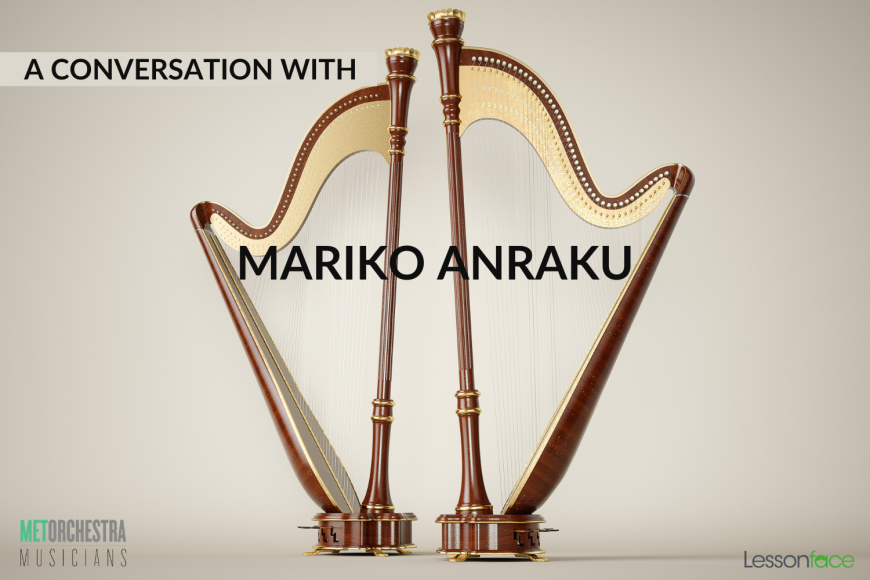A Conversation with MET Orchestra Harpist Mariko Anraku

“What advice would you give to students who are seriously invested in their future as a harpist?”
“Consistency. Commitment. Perseverance. Patience.
"Courage to keep going no matter what happens — and the courage to bounce back. Staying positive and motivated. Not being hard on oneself. Keep the spark and joy in music — and have fun. Enjoy and love the music that you’re playing in every moment.”
Mariko Anraku, Associate Principal Harpist of the Metropolitan Opera Orchestra since 1995 and professor at the Manhattan School of Music and the Pacific Music Festival, gifted us with these answers and far more wisdom besides. Coming from a highly successful career, Mariko posits that it’s a general frame of mind needed to be as successful as possible.
“It’s all the same, whether it’s your job, or playing the harp or another musical instrument, or simply walking down the street, [it’s about] whether we do it with gratitude or just being in the moment. It’s really being thoughtful and caring for each note. What kind of tone am I trying to express? What is the essence that I want to convey?”
Of course, a foundation in one’s instrument is necessary to allow one to be truly expressive, but such artistry goes far beyond the realm of technique. Someone can play well, but it’s not going to be expressed in the same way without the ability to empty oneself while simultaneously opening to the music. How can this be accomplished?
Meditation.
ON MEDITATION
“I really think meditation practice is really important — it’s really helpful for anyone and any part of life, but especially for musicians because we’re just a medium for the music.
“In life, or in music, anything can happen. Someone who meditates is more likely to stay calm when stuck in traffic, or in facing the unexpected. Not only does meditation help one’s concentration, focus, and objectivity, but it also helps us become empty so that our egos don’t get in the way.
“In the end, it’s about the music and the essence of the music. It’s not about what someone can do. At a certain level, we already know you can do it. The true musicians are the ones where the word ego is not even there, it's just about the music.
“What’s really important in music is that we don’t just play the black notes that are printed on the page. There's so much more beyond that; it’s so much deeper. What is the music trying to convey? You have to explore, go deep and discover — and then add your own interpretation, your love, your spirit, your soul.
“Your own voice should be in service to what the composer has done; this is what being musically expressive is about. Through your capabilities of expression, we want to become one with the music (meaning the composer's soul) so you have to become empty.
“I tell my students to take time when they first sit down at the harp to breathe, get in touch with their bodies, and relax because you want to start from a place of relaxation.
“How you are feeling physically, mentally, and emotionally will come out in your sound. If you’re agitated or not relaxed, that struggle will come through. Music is a wordless world; the spirit of music will come through you as the vessel.
“We want to come from a place of spaciousness and generosity. I think it helps if we have a healthy lifestyle and if we meditate. Meditation could be different for everyone. It could be going for walks in the park or nature or just going within [oneself].”
It’s too easy to get caught up in all the demands on our time with all the various roles we each inhabit. However, when our lives get out of balance, we, or our music, can suffer. Staying balanced and objective is really important, both for practice sessions and success in life.
How do we get to a healthier balance in life?
TAKE BABY STEPS
“Life is a marathon, not a sprint. I think often people who approach life in the marathon way end up being happier,” says Mariko. Whether you’re trying to establish healthier practice habits, or a healthier lifestyle, it’s important to “take baby steps.”
The overall general wellness of your life matters, not just your musical life. “Get enough sleep, have a healthy lifestyle. Eat well. Sleep well. Exercise, meditate, and have a balance. Life is more than just practicing; you should have some fun, too,” recommends Mariko.
Building on this notion, she suggests a gradual approach to beginning a meditation practice. “Just do it and don’t be hard on yourself, start with first 3, then 5, then 10 minutes, these little increments of time of just staying still and quiet. See how you feel and don’t judge yourself.
“You can have big goals for all you want to accomplish, but they need to be broken down. Make a schedule for yourself for the week which then you can parcel into manageable daily tasks. Do it at the start of the week, every Sunday afternoon or night, and plan the next week.”
Such scheduling is an excellent way to track important tasks in life, whether it’s a practice schedule, or working toward other career goals. But it takes more than a well-planned week to strive towards a healthy lifestyle.
“Always focus on the positives,” Mariko says. “It’s been hard for everybody to stay motivated. It’s important to focus on all the silver linings. We still have music, we can still practice or listen to music.
“It’s hard for everyone globally, but it really shifts our mentality when instead of digging a hole deeper by only thinking about the negative we focus on gratitude. The more we focus on the positive then the more that positivity comes back to us.”
Mariko prioritizes the importance of a healthy life balance to her students all of the time. In her weekly harp lab class, the first order of business is meditation, a few minutes where students can scan their bodies and get into a place of relaxation, calm, and focus.
“Everyone has stress — even before the pandemic; there’s so much to do in college.” After meditation, students are then able to share their intentions for the week, focusing on the positive with things they are proud of, and reconnect with their harp community.
“It’s important to have a community for yourself. Have some place to bond with like-minded others,” Mariko suggests, “particularly for the pandemic, but especially for students in school. They get so narrow minded and bogged down; everyone’s trying so hard to achieve the next thing. And that’s great, but then it’s also important to share and be there and support each other. You don’t have to talk about music all the time.”
Reaching beyond overall wellbeing into specific practice advice, Mariko imparts the following:
QUALITY NOT QUANTITY
“Aiming for quality is far more important than quantity. A focused practice session will allow more progress than practicing with no goals in mind. You can practice for hours, but if you’re not focused on what it is that you want, or need, to practice, you won’t be able to achieve the same results. Be thoughtful, mindful, and expressive.
“If we can become objective -— instead of judging yourself, praise yourself — and get self-judgement out of the way in a practice session, it’s a far better way to make progress.
“Let’s say something happens. You make a little mistake and you judge yourself, then the next moment is going to come out in that harsh way; it’s not going to come out in a beautiful manner.
“The key for this objectivity is awareness, building an awareness in every moment. Meditation helps with that. Through meditation we can become more objective and flow freer. This allows us to identify what do we truly need to practice; and then do so without self-judgement getting in the way. All of this holds true whether you are a student or a performer.
“As when building a meditation practice, trying too hard will set you back. It’s easy for self-judgement to slip in when focusing on the one passage that we need to perfect, again creating a less-than-ideal environment for growth and musicality.
“Trying too hard actually gets in the way of our practice or performance. While true in life, this is particularly true in music. When you try so hard then your tone and expressiveness is gone — it’s blocked. We want to come from a place of spaciousness and generosity. And this is easier to do if we have a healthy lifestyle and if we meditate.
BE EFFICIENT
“It’s also important to organize your practice time to be efficient. Zone in on what it is you want to get done that week. You can even write out a weekly chart, breaking down every day’s practice session.
“Don’t practice for two hours in a row. Even if you have the time for an interrupted long practice session, take a break every half hour to do some jumping jacks, or go for a quick walk. Do something to get moving again to refresh your mind and body. You need to make sure that you’re relaxed to be in the best frame of mind for your practice time.
“So many people get injured from stress, whether it’s physical repetition or emotional stress; taking care of oneself by taking short breaks is important.
“Everyone is different therefore everyone’s practice session will be different, but it’s really important to think first. Rather than just sitting down and practicing, organize what you’re going to practice and why. This helps to focus your session and to consequently reach goals to always be making progress.
“It’s nice to take time to practice the parts you want to so you’re inspired and it gets you going, but it’s actually the sections of things you don’t want to do that you may need to do first. Or, you could play your favorite part first, then immediately get to the places that need work. Otherwise you’re likely to keep procrastinating.
“The other thing I find with students sometimes is that even when they realize that something is not going right they’ll just keep doing it the same way. Stop and look at it. Figure it out. Or bring it to your lesson and ask.
“Don’t acquiesce to parts that don’t sound right or ignore the hard parts; take note. These are the moments we need to pay the most attention to, without self-judgement. And of course, this circles back to what we need to practice and why, and the need to organize our practice time.”
BALANCE
Overall, music, and life, is about balance. We want to be objective, but we also need to be really into the music. The heart of music and why we are here is that music is a whole other language; one which we can express if we can but embody that essence.
If we just say the words without adding meaning, just playing the black notes on the page without truly putting thought and consideration into every note, we can play a piece, yes, but are we truly making music?
Be thoughtful. Be mindful. Be relaxed. Strive for balance. These are some of the many wisdoms of harpist Mariko Anraku.
If you’d like to hear more wisdom from Mariko and other MET Orchestra Musicians or audition for an upcoming Master Classes, be sure to check out the upcoming and recorded MET Orchestra Musicians Master Classes.





